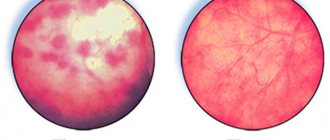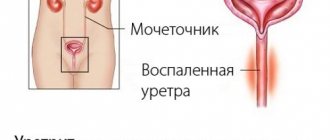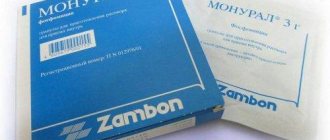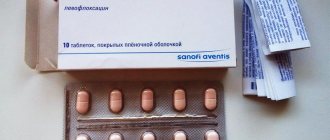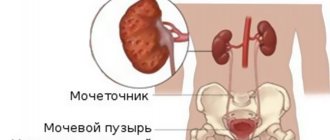A common disorder, cystitis (inflammation of the bladder) is often caused by several problems, including bacterial infections, constipation and weakness of the muscles that support the urinary tract, neurological disorders and hormonal imbalances. Very often the disease affects middle-aged women during menopausal changes in the body. This is due to the loss of estrogen's effect on muscle tone. Let's look at how to treat cystitis with homeopathy and how effective it is.
What is cystitis
Cystitis or inflammation of the mucous membrane of the bladder causes a lot of trouble for the fair half of humanity. At the same time, according to statistics, men suffer from this disease 8 times less often!
Why such injustice? It's all about the structural features of the female urethra: it is much shorter and wider than the male one.
In medical practice, there are primary and secondary, acute and chronic, infectious and non-infectious cystitis. All types of cystitis have a common picture of the disease.
The mechanism of action of homeopathic remedies on cystitis
The disease cystitis is divided into two forms: acute form and chronic form of the disease.
The disease cystitis comes suddenly, the symptoms in the initial stage of the disease are pronounced. Symptoms of the chronic stage of cystitis are the same as in the acute form, only less pronounced and aggravated during relapses of cystitis:
- a sharp sensation of pain at the time of urination;
- burning in the urethral canal when emptying the bladder;
- frequent urination, with a small amount of urine output;
- feeling of a full bladder, even after urination;
- swelling of the external genital organs and the head of the urethral canal;
- itching in the genitals and burning to the touch;
- in severe cases - temperature within 38 degrees;
- putrefactive odor of urine mixed with particles of blood, pus and mucus.
Cystitis in the chronic stage is often accompanied by diseases associated with gynecology, disruptions in hormonal levels and the digestive system. In men, against the background of chronic cystitis, inflammation of the prostate develops.
Along with antibiotic therapy, treatment with homeopathic medicines is widely used. Homeopathy remedies help relieve symptoms of acute cystitis and chronic cystitis in the relapse stage, improve the functioning of the immune system, the functioning of the patient’s internal organs and normalize the cardiac and vascular systems.
Treatment of cystitis with homeopathy relieves painful symptoms within a day and the duration of treatment with homeopathy for acute cystitis is 7 - 10 calendar days, for cystitis in the chronic stage of the disease - up to 60 calendar days. In case of complicated cystitis, the attending physician can prescribe a course of treatment with homeopathic remedies - up to 90 calendar days. During treatment with homeopaths, it is necessary to drink fluids per day, at least 2 liters.
Homeopathic medicines and alcohol are not compatible.
Causes
There are many reasons for the development of the inflammatory process.
We are talking about the infectious nature of the disease if a bacterial pathogen is detected in the urine - in most cases it is a common E. coli.
But cystitis can also be non-infectious. Chemical exposure, allergies, and the effects of radiation therapy can trigger inflammation. Cystitis can also develop as a secondary disease in the presence of urolithiasis, prostatitis, prostate adenoma, vaginitis and other “female” diseases, chronic pyelonephritis and tumor processes in the bladder itself.
Pay attention to this fact: bath foam can cause inflammation of the bladder. Therefore, try not to use it yourself and do not bathe children in foam.
How to distinguish cystitis from urethritis?
- Symptoms of diseases
- Main differences between diseases
- How are pathologies treated?
A huge number of diseases occur with similar symptoms. Patients especially often confuse pathologies such as cystitis and urethritis. But both diseases are significantly different from each other and require different approaches to treatment. It is noteworthy that both diseases can occur simultaneously and also be a consequence of each other. Inflammatory processes in the pelvic area occur equally often in both sexes. This pathology is also often diagnosed in children.
Have you been fighting CYSTITIS for many years without success?
Head of the Institute: “You will be amazed at how easy it is to cure cystitis by taking it every day...
Read more "
Urethritis is an inflammation of the mucous wall of the urethra. A factor in the development of the disease is pathogenic flora. Sometimes the pathology develops as a result of infection with an STI, especially in women. Traumatic and allergic urethritis is extremely rare. In the last two cases, narrowing of the urethra is more often observed.
With cystitis, inflammation is limited to the bladder mucosa. As a result, there is a change in the urine pattern and disruption of the organ. Pathology can be caused by infection, hypothermia, injury, allergies and even anatomical features. With a chronic course, the likelihood of developing tumors, structural changes and other complications increases.
Symptoms of diseases
From the definition of pathologies, it becomes clear that both diseases manifest themselves in inflammation of the mucous membrane of the urinary organs. The causes of both pathologies are similar and, moreover, the clinic has many of the same symptoms. But there are still differences and it is important to take them into account when diagnosing diseases. This will reduce the duration of treatment.
Despite the fact that patients often confuse cystitis with the symptoms of urethritis, they still have their own differences. The main signs of cystitis include:
- discomfort when passing urine;
- increased unpleasant odor of urine;
- the color of urine changes, impurities appear;
- Women experience abdominal pain.
Inflammation of the urethra is characterized by the following symptoms:
- burning when urinating;
- discharge from the urethra;
- abnormalities in urine tests;
- In women, inflammation of the vagina.
Main differences between diseases
At first glance, it seems that urethritis and cystitis are very similar in clinical symptoms. In both cases, pain and change in urine color are noted. In addition, in women, pathology can easily spread to the genitals due to the proximity of the location. That is why it is especially important when a patient contacts to conduct a thorough diagnosis of pathologies.
The main difference between diseases is the localization of the inflammatory process. Urethritis is an inflammation of the urethra, and cystitis affects the bladder. In women, diagnosis is complicated by the peculiarities of the anatomical structure, since the urethra is short, and the inflammatory process very quickly spreads to the walls of the bladder.
The following differences are related to symptoms. For example, with urethritis, the smell of urine never changes. In addition, the patient's general condition changes extremely rarely. There is no fever, no general intoxication, and the pain is localized. The characteristics of urine excretion also change. With cystitis, it is released in small portions, but often.
Urethritis is equally common in both sexes, and cystitis occurs more often in women, which is again explained by the peculiarities of the anatomy. In addition, it is important when complaints of painful urination appear to exclude inflammation of the genital organs, since cystitis often develops as a complication of sluggish vaginitis or vulvitis. When assessing symptoms, it is important to remember that the pathology clinic can be either pronounced or hidden. In the latter case, it is especially difficult to distinguish these two pathologies based on complaints.
In addition to the above, there are differences in laboratory tests. Most often, in addition to a general urine test, a Nechiporenko test is prescribed. It allows you to count the number of leukocytes and erythrocytes in the material. Normally, 2 thousand leukocytes and a thousand erythrocytes are allowed per milliliter of urine tested. Inflammation of the urethra can change the urine pattern, causing normal values to increase up to five times. Higher levels of leukocytes and erythrocytes are more characteristic of cystitis.
It is especially difficult to identify the difference between the two pathologies in children. They cannot determine the localization of pain, due to which both diseases proceed clinically in the same way. When palpating the abdominal area, pain is noted in the pubic area. In addition, it is difficult to assess urine in children in the first year of life. The diagnosis is made based on the results of tests and analyses.
How are pathologies treated?
Despite the fact that both diseases have their own clinical course and the causes of their occurrence are sometimes the same, before starting treatment it is important to conduct a thorough diagnosis. For this purpose, the patient is examined. Already at this stage, you can notice discharge from the urethra, which is more characteristic of urethritis. Next, a laboratory test of urine and blood is prescribed. As a result, it is possible to determine the localization of the inflammatory process and the type of pathogen, which is especially important when prescribing medications.
Both pathologies are treated on an outpatient basis. Only in rare cases, in the presence of purulent inflammation, hospitalization may be required. Therapy includes the prescription of antibacterial drugs, vitamins and immunomodulators. Diet correction is also important. It is especially needed in cases where the main cause is injury or the consequences of surgery. Also, nutritional correction is required if there are stones and sand in the bladder.
Antibacterial drugs are selected based on sensitivity culture results. It is important to note that antibiotics are used only if pathogenic flora is present. The form of the drug is determined based on the severity of the pathology, but practice shows that the tablet form is more often used and injections are prescribed only in advanced cases.
As an exception, in case of gastrointestinal pathology or with a large number of contraindications, antibacterial drugs in the form of suppositories are used. The same release form is used during pregnancy in women.
With a competent treatment plan, the pathology can be eliminated within ten days. Termination of therapy is permitted only if the result for pathological flora is negative. After completing the course, it is recommended to carry out rehabilitation therapy using drugs to normalize the intestinal microflora.
The video below provides additional information about urethritis:
Traditional treatment methods
How to cope with this scourge?
Traditional treatment, however, is well known. Rest, warmth, plenty of fluids, diuretic herbs, exclusion of spicy, salty, smoked foods from the diet. In addition, doctors will prescribe you antispasmodics and antimicrobials, including antibiotics. But the trouble is, even the notorious E. coli is resistant to a good half of antimicrobial drugs...
Doctors convincingly ask you not to interrupt the course of antibiotic treatment until the bitter end, and cystitis obediently recedes. But once you stop taking antimicrobials, the symptoms return. They got nervous, became hypothermic, broke their diet, after intimate relationships... And so month after month, year after year.
Contraindications, side effects, special instructions
The main contraindication to the use of a homeopathic remedy is the inability of the body to tolerate the components in the composition of this homeopathic remedy.
Also, a contraindication may be severe diseases of internal organs and systems in the human body, for which taking these drugs is not recommended.
Many people believe that homeopathic remedies have almost no negative effects, and yet this statement is not entirely true. These tablets contain synthetic compounds, albeit in very small quantities, but they can cause a negative response from the human body.
- redness and itching;
- nausea;
- rash.
If suspicious signs occur, you need to stop treatment and consult a specialist. In general, homeopathic remedies, provided they are properly selected, can have a positive effect on the affected bladder. You can buy such medicines both in online stores and in all regular pharmacies. Real reviews from cured people indicate that these natural remedies are very effective.
Possibilities of homeopathy for cystitis
Why does cystitis hold us so stubbornly in its embrace? There are many reasons.
- the body may be weakened due to taking antibiotics
- It is possible that you have a constitution prone to genitourinary diseases.
All this only testifies to the complex nature, no, not the disease... of the person himself. The trinity of body, soul and spirit has never been seriously considered by official medicine. She prefers to treat diagnoses rather than people.
Homeopathy treats a person. That is why she unobtrusively and gracefully copes with cystitis of any etiology. And note, without any harm to health! Homeopathic treatment of cystitis is possible even in infancy and old age, during pregnancy and lactation - without side effects.
What is the secret of homeopathy? During a long conversation with the patient, the homeopathic doctor of the classical school finds out the constitutional type of the person and selects one single medicine out of a thousand that suits the patient like a key to a lock.
This single drug acts in a similar way to the symptoms of the disease and leads a person to healing. Gently, gradually eliminate all problems in the body. Is there any doubt that cystitis will have no place in a properly functioning system? And not only him. Sounds like a fairy tale, doesn't it?
But the truth is that we have forgotten how to trust ourselves, the wisdom of nature and our body, which is capable of working miracles if allowed... In the video lectures of the course “For Every Mother” you will learn everything about the work of a homeopath, the rules for selecting a homeopathic remedy for a wide variety of diseases.
Can it be used by children?
A child can get cystitis at any age, whether he is a teenager, a schoolchild or a child in a preschool institution. It appears as a result of an infection entering the body.
The first signs of cystitis in children are similar to those in adults:
- frequent urination and dark urine;
- increased body temperature;
- lethargy and loss of strength;
- pain in the lower abdomen.
Initial symptoms are mild.
The following opportunistic microorganisms provoke cystitis in childhood:
- colibacteria;
- chlamydia;
- yeast fungi Candida;
- cocci;
- worms and others.
Children with weakened immunity, chronic diseases and hereditary predisposition are mainly exposed to inflammatory processes. Babies under one year old get sick regardless of gender. In older children, this pathology is more pronounced in girls due to the anatomical structure of the female genitourinary system.
Homeopathic medicines are approved for use by children, as they are considered safe for their health, hypoallergenic, and demonstrate high treatment effectiveness in eliminating problems of the genitourinary system. In addition to taking natural remedies, another effective treatment that children should do is bed rest to reduce pain during natural bladder emptying.
It is useful to combine homeopathy in children with a healthy, proper diet, to exclude any immunosuppressants, as well as homeopathic substances that conflict with each other.
In order for medications to give a lasting and quick effect, you need an individual selection of medications and consultation with a doctor with many years of homeopathic experience.
Staphysagria
Cystitis occurs in response to violence, unspoken anger, humiliation. “Honeymoon cystitis” or a new sexual partner, after the first wedding night. Cystitis as a consequence of surgery, childbirth, bladder catheterization.
Now you see how many faces cystitis has in the eyes of a homeopath, but this is only a small part of the successfully used drugs. Homeopathic treatment of cystitis is a delicate matter, especially if the process is chronic. Therefore, we strongly recommend that you do not self-medicate, but seek the help of an experienced homeopathic doctor.
The main advantages of treatment with Canephron
The inflammatory process always involves oxidative stress. This means that free radicals are produced in the body, and their undesirable effect on the functioning of systems is increasing. The result may not be the best - the disease will become chronic. So, the plant extracts that make up Canephron have antioxidant properties; they reduce the negative effect of free radicals on cell structures.
Why the drug is effective:
- It quite quickly removes spasms, pains and cramps;
- The process of urination becomes manageable;
- Relapse rates are reduced;
- It prevents the development of chronic cystitis;
- Improves kidney function, as well as the entire urinary system.
Homeopathy "Berberis": indications for use
This drug is used for damage to the liver, urinary tract and kidneys. It eliminates inflammation, reduces the risk of stones, speeds up the healing process, and relieves discomfort and burning. It is considered an effective drainage agent. Also in the indications for the use of Berberis homeopathy, the instructions to which are attached, there is information that it is prescribed to people suffering from gout.
Homeopathy "Arnica": indications for use
To make a remedy, the flowers of such a plant are usually used. The roots and foliage of the grass are used for such purposes only in rare cases. Preparations based on it are recommended for the treatment of cystitis, if the disease arose as a result of the passage of stones, surgery or catheterization. Homeopathy "arnica", the indications for use of which are given in the instructions, fights the involuntary leakage of urine after surgical interventions.
To prepare a medicinal potion you will need flowers of mountain arnica, mantle and yarrow. Just pour boiling water over the herbal mixture, let it steep and take it before going to bed.
Treatment of cystitis in women and children with homeopathy - popular drugs
Homeopathic remedies are often prescribed for cystitis. For the success of homeopathic therapy, it is important to strictly adhere to the homeopath's recommendations. It is he who must select the drug. The sooner the diagnosis is made, the sooner recovery will occur.
For effective treatment, homeopathic medicines should be combined with basic ones. Therapy must be comprehensive. You cannot rely on homeopathy alone. Cystitis is not so easy to treat. It is important to overcome the infection and eliminate the inflammatory process. To do this, you need to use several drugs at once.
Women and men suffer from cystitis (women more often). The risk group includes children and the elderly.
Such drugs have very few contraindications. They are suitable even for pregnant women and children. During pregnancy, cystitis occurs quite often. And it becomes a real test, because the standard treatment regimen cannot be used, as it can harm the fetus. This is where safe homeopathic remedies will come to the rescue. But they should be selected exclusively by a doctor, preferably a homeopath.
Advantages of homeopathy in the treatment of cystitis:
- will be addictive;
- allergies excluded;
- medications are time-tested, the mechanism of their action is well known;
- can be used not only for treatment, but also for prevention;
- there are very few contraindications;
- can be used to treat patients of any age;
- can protect against many infections and viruses;
- do not interact negatively with other agents;
- the price is affordable for everyone.
Selection of medicinal products
Homeopathy for cystitis is based on certain principles with which their effectiveness and impact are directly related.
A competent specialist will never prescribe more than one drug for treatment. Because several of these drugs do not allow the doctor to predict how they will affect a patient with complex disorders. To a greater extent, this is due to their compositions, which can be completely opposite in nature.
The ability to control the treatment process is lost. The doctor will not be able to identify the cause of the deterioration, the manifestation of additional symptoms, or reliably state an improvement.
Application of the “small dose” rule - the patient is prescribed drugs in the very minimum dose. Ignoring this rule can lead to a deterioration in your general condition and a slowdown in recovery.
- what preceded and provoked the development of cystitis,
- features of the inflammatory process, the nature and frequency of symptoms,
- localization, nature and time periods of pain,
- possible cause of increased pain symptoms,
- the presence of concomitant disorders (anxiety, drowsiness, depression, etc.) and diseases.
The selection of the drug required in this case is carried out only after analyzing the data obtained and diagnostic results. The doctor determines the dosage of the drug and the duration of treatment. Gives necessary recommendations for admission.
Admission rules
Treatment of cystitis with homeopathic medicines requires special conditions for their administration. To get the desired effect, you must:
- exclude products that neutralize the properties of the medicine. These include coffee, camphor and essential oils, mint;
- Use any homeopathic remedies separately from food - an hour before or two hours after;
- before swallowing tablets, granules or drops, keep them in the mouth for a couple of minutes, allowing them to penetrate the mucous membranes;
- Observe proper storage of medications, in particular, avoid proximity to equipment with electromagnetic radiation. Also, any homeopathic remedy does not tolerate cold.
Homeopathic medicines
Homeopathic medicines are selected by the doctor according to the manifestation of clinical signs of cystitis, taking into account the characteristics of the individual patient’s body. Despite the huge selection of homeopathic remedies on the pharmacological market, independent selection is extremely undesirable, as it can lead to the opposite effect - exacerbation of the disease and deterioration of the general condition.
- Powdered Spanish fly "Cantharis". The relaxing property of the drug has found its application in cases of pain and burning during urination.
- Extract from the honey bee or its venom “Apis mellifica”. Efficiency is manifested in cases of urinary incontinence and nocturnal enuresis, and urination accompanied by pain.
- Extract or powder of nightshade leaves collected before flowering "Dulcamara-plus". It is prescribed for signs of irritation of mucous tissues, frequent urge to urinate and the presence of foreign impurities in urine.
- Salts of dried bark and stems of barberry "Berberis vulgaris". It is used for signs of wandering pain spreading to the ureter. Promotes free passage of formed stones.
- Root of the tropical vine "Pareira brava". It has diuretic and analgesic properties. Prescribed to relieve severe pain symptoms and restore urination problems due to cystitis.
- Naturally dried cuttlefish ink liquid "Sepia". Prescribed for problems with urination caused by functional disorders of the sphincter. Eliminates venous congestion, inflammatory and purulent processes in the mucous membrane of the bladder.
- Mulched seed powder "Nux vomica" - chilibuha emetic. Prescribed to relieve acute processes of antispasmodic pain in the bladder and pain when urinating.
You should remember the principle of homeopathy - improper use and dosage can have the opposite effect. Independent selection of treatment is unacceptable.
The drug "Apis" for inflammation
This medication is used when painful, scanty and frequent urination occurs. Quite often they resort to it if, during cystitis, blood or purulent impurities are observed in the urine. Homeopathy "Apis", the indications for which recommend using the drug for cystitis, contains honey bee extract, which has medicinal properties. The medicine is produced in the form of granules, rectal suppositories, injection solution and drops.
Indications for the use of Apis homeopathy are indicated in the instructions. The homeopathic remedy in question also has a healing effect for kidney pathologies. If after the first dose of the drug your health worsens, you should stop taking it for at least 14 days.

